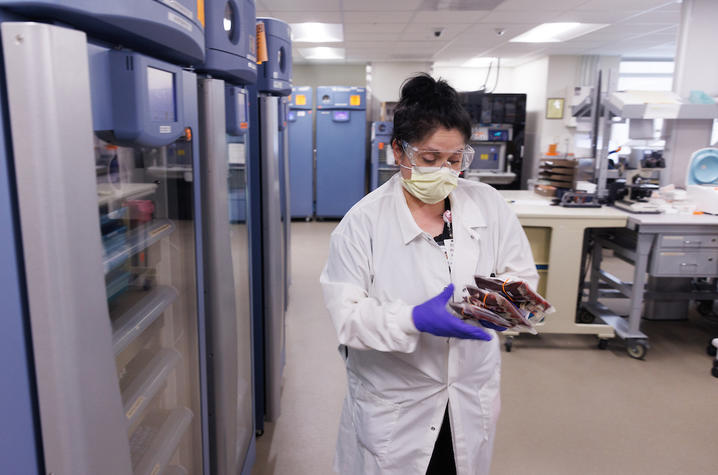New blood donation guidelines reinstate eligibility for thousands of potential donors

LEXINGTON, Ky. (Feb. 16, 2023) — Following recently updated guidance by the U.S. Food and Drug Administration, Kentucky Blood Center (KBC) reinstated eligibility for donors who were previously deferred from blood donation due to travel or residence in the United Kingdom, France or Ireland.
The deferral was related to a theoretical risk of transmitting variant Creutzfeldt-Jakob Disease (vCJD, also known as mad cow disease) to blood transfusion recipients. The FDA has determined this is no longer a concern for donors who have previously lived in the United Kingdom and other European countries.
As a result, KBC has removed all indefinite deferrals for nearly 4,000 KBC donors who were affected by the previous guidance.
“We are really excited to welcome back the thousands in our community who were previously denied the opportunity to give the gift of life,” said Dennis Williams, M.D., KBC’s medical director. “This move not only impacts donors who were previously deferred, it offers an opportunity for countless other individuals who have never attempted to donate because they were aware of the deferral.”
KBC encourages those who previously refrained from donating blood due to their time spent overseas related to this deferral to visit a KBC donor center or mobile blood drive as soon as possible.
Donors will still see questions on the health history questionnaire related to time spent overseas, but that travel will no longer result in a deferral related to vCJD. Of course, there are many things that can cause a deferral, but KBC encourages everyone newly eligible under this guidance change to give blood donation a try.
Previous FDA guidance recommended indefinite deferral for people who spent time in the United Kingdom from 1980 to 1996 or France and Ireland from 1980 to 2001, or people who received a blood transfusion in the U.K., France or Ireland from 1980 to the present.
The removal of the 20-year-old European ban comes at an important time for Kentucky’s blood supply. Blood donations are significantly down over the last two and a half years, and while donor turnout has failed to return to pre-pandemic levels, transfusion usage has continued to grow.
“Human blood has no substitute. The only replacement for lost blood, is donated blood,” said UK HealthCare trauma surgeon Andrew Bernard, M.D.
The diverging trends have put a significant strain on Kentucky Blood Center, which provides blood to more than 70 hospitals across the state including UK HealthCare. UK HealthCare transfuses about 35,000 units of blood per year. It is used throughout various areas in addition to the emergency department and helps patients who are enduring all different kinds of medical needs.
KBC strives to maintain a three-day supply of blood to meet hospital needs for everything from cancer treatments to premature births, car accidents, diseases, surgeries and more, but KBC has often operated with a day’s supply or less for many blood types since the start of the pandemic.
To ensure local patients aren’t at risk, KBC urges eligible and potential donors to schedule an appointment for donation at any of KBC’s eight donor centers or mobile drives. There are two mobile drives scheduled to take place at UK in the coming weeks. Follow these links for more info and to register:
- Feb. 21: UK College of Pharmacy
- Feb. 27: UK Healthcare at Turfland
Donors can visit kybloodcenter.org or call 800-775-2522 to make an appointment or check eligibility. Appointments are preferred, but walk-ins will be accepted as space allows. Donors are encouraged to answer their health history questions online on the day of their donation by completing their QuickPass at kybloodcenter.org/quick-pass.
UK HealthCare is the hospitals and clinics of the University of Kentucky. But it is so much more. It is more than 10,000 dedicated health care professionals committed to providing advanced subspecialty care for the most critically injured and ill patients from the Commonwealth and beyond. It also is the home of the state’s only National Cancer Institute (NCI)-designated Comprehensive Cancer Center, a Level IV Neonatal Intensive Care Unit that cares for the tiniest and sickest newborns and the region’s only Level 1 trauma center.
As an academic research institution, we are continuously pursuing the next generation of cures, treatments, protocols and policies. Our discoveries have the potential to change what’s medically possible within our lifetimes. Our educators and thought leaders are transforming the health care landscape as our six health professions colleges teach the next generation of doctors, nurses, pharmacists and other health care professionals, spreading the highest standards of care. UK HealthCare is the power of advanced medicine committed to creating a healthier Kentucky, now and for generations to come.




